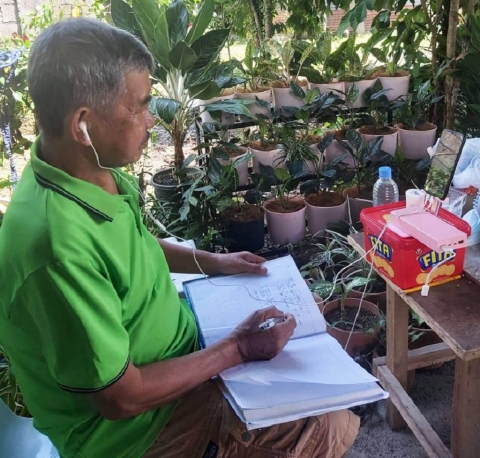A farmer-participant from Aurora attends the online Digital Farmers Program 101 by improvising a study setup outside his house.
More farmers are taking on the challenge to become future-ready as they participate in the first level of the Digital Farmers Program (DFP), the DFP 101.
After the conduct of the DFP 101 Master Trainers’ Bootcamp in June 2020, the Agricultural Training Institute’s (ATI) network of training centers resumed to reaching more farmers and youth towards creating a digitally enabled farming environment.
A total of six batches were rolled out in September 2020 with over 100 participants from farmers’ associations and rural improvement clubs (RICs). These were led by the ATI Regional Training Centers (RTCs) in Central Luzon, MIMAROPA, and Eastern Visayas. Moreover, as part of the Institute’s strategies under the new normal, the RTCs implemented both online and face-to-face modes of delivery, ensuring all standard health protocols were followed.
By the end of the session, farmers were acquainted with the basic parts and uses of a smartphone, access the Internet, as well as introduced to social media and basic agriculture applications such as weather monitoring, e-Learning, and land area measurement tools.
"Malaking tulong ito na mas madaling makikilala ang mga produkto namin lalo na sa pandemiyang hinaharap. Malaking tulong ito sa aming magsasaka at RIC sa probinsya. Nakakatuwa na malaman na marami palang magagawa gamit lamang ang smartphone," Perlita Abaco, a farmer-participant in the DFP 101 Bataan leg, shared.
[This is a big help for us farmers and members of RICs in provinces to promote our products especially during this pandemic. It is nice to know that there is so much you can do with a smartphone.]
Likewise, the youth-participants—who are more tech-savvy—took time to guide their farmer-partners in maximizing the use of their smartphones, getting resources from the Internet, and venture into online selling.
“DFP 101 helped enable farmers to gain knowledge on how to promote their products online. They no longer need to physically vend their products. Since it is online, buyers come in fast and transactions between sellers and buyers are much easier,” Jeffrey Ciro Subayno, a youth-participant in Baybay, Leyte, noted.
Twenty five more batches are expected to be organized this year in various provinces including Quezon, Aklan, and Davao del Norte, among others. All DFP 101 finishers will be moving up to the second level of the program—the DFP 102—by the second semester of 2021.
The DFP is a ladderized capacity-building activity, spearheaded in partnership with Smart Communications Public Affairs. It engages the youth in a three-course sequence focusing on acquainting and empowering farmers starting from basic digital tools such as social media to more complex services such as e-commerce and online payment systems.

